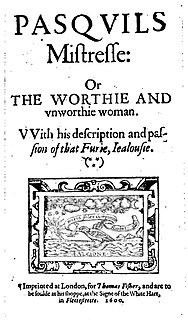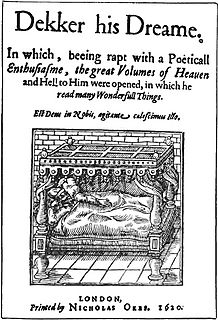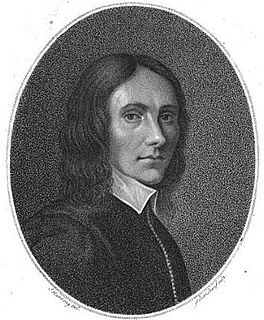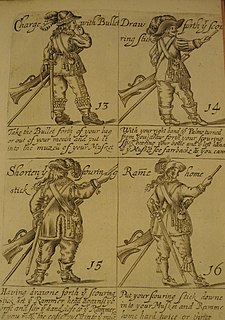Related Research Articles

Nicholas Breton was a poet and prose writer of the English Renaissance.

Francis Quarles was an English poet most notable for his emblem book aptly entitled Emblems.

Thomas Dekker was an English Elizabethan dramatist and pamphleteer, a versatile and prolific writer, whose career spanned several decades and brought him into contact with many of the period's most famous dramatists.
Nigel de Longchamps, also known as Nigel Witeker, and Neel de Longchamps, was an Anglo-Norman satirist and poet of the late twelfth century, writing in Latin. He is known to have been a monk of Christ Church, Canterbury, from 1186 to 1193, and perhaps earlier.

John Oldham was an English satirical poet and translator.
Tail rhyme is a family of stanzaic verse forms used in poetry in French and especially English during and since the Middle Ages, and probably derived from models in medieval Latin versification.
Samuel Rowlands was an English author of pamphlets in prose and verse which reflect the follies and humours of lower middle-class life in his day. He seems to have had no literary reputation at the time, but his work throws much light on the development of popular literature and social life in London, where he spent his life. His contact with the middle and lower classes of society included working in 1600–1615 for William White, and then George Loftus, booksellers, who published Rowlands's pamphlets in this time.
Nationality words link to articles with information on the nation's poetry or literature.
William Baldwin was an English author.
Thomas Master was an English poet and divine. He also assisted Edward Herbert, Baron Herbert of Cherbury, in his writing of the Life of Henry VIII. He translated Herbert's work into Latin.
John Awdely was an English printer in London, known as a writer of popular and miscellaneous works.

John Quarles was an English poet.
Francis Sabie was an English poet.
Peter Fabell or Fabel was a reputed English magician who lived in Edmonton. A literary figure during the 16th and 17th century, he is considered by David Kathman to have been a historical figure, whatever the accretion of folklore to his name. He appears as the protagonist in the play The Merry Devil of Edmonton, printed 1608.
William Austin, was an English writer of verse and classical scholar.
Antony Brewer was a dramatist, author of The Love Sick King, to whom a number of other works have been attributed.
George Daniel (1789–1864) was an English author of miscellaneous works and book collector.
Thomas Beedome was an English poet. He appears to have died at an early age, and of his life nothing is known.
Mary Latter was an English poet, essayist and playwright of the 18th century.

Thomas Jenner was an English author, engraver, and publisher in London. He kept from 1624 a print-shop by the south entrance of the Royal Exchange; it was recommended by John Evelyn to Samuel Pepys.
References
![]() This article incorporates text from a publication now in the public domain : "Brewer, Thomas (fl.1624)". Dictionary of National Biography . London: Smith, Elder & Co. 1885–1900.
This article incorporates text from a publication now in the public domain : "Brewer, Thomas (fl.1624)". Dictionary of National Biography . London: Smith, Elder & Co. 1885–1900.